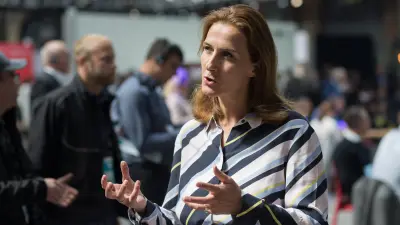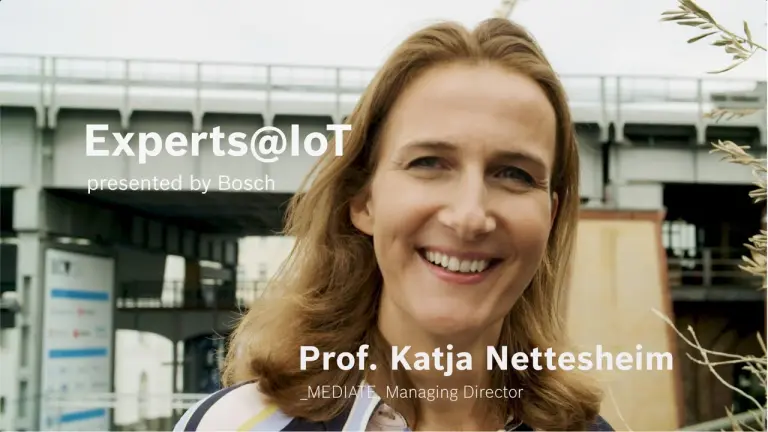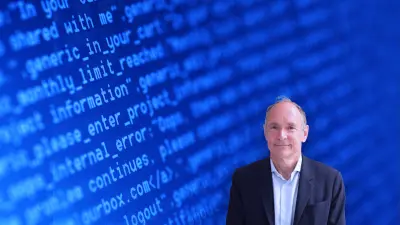Digital business transformation
In dialogue with the Professor of Digital Media Management at Steinbeis-Hochschule Berlin and CEO of the consulting firm _MEDIATE.

2019-12-11
There are clear winners and losers in the digital transformation, notes Professor Nettesheim, who, as a management consultant, is aware that cultural change is key for success.
Properly understanding the digital transformation
“You have to keep up with the times, or in time you’ll be gone” — transformation expert Katja Nettesheim believes that Friedrich Schiller’s views about progress more than 200 years ago are still relevant today, in the context of digital transformation. While Silicon Valley is home to many digital natives who drive digitalization, businesses worldwide are still lagging behind.
Holding on to outdated structures and fear of change are the factors clearly distinguishing the losers from the winners on the march forward into the digital age. Dr. Nettesheim believes that a flawed understanding of digital transformation is often the reason why the process is more fraught for some than for others. After all, it’s about more than just IT solutions: “Digital transformation is a holistic process that revolves around the entire company.”
More than just technology

Having practiced the discipline for 15 years, the media expert is convinced that digital transformation has to occur across multiple areas of a company if it is to actually take effect: “From the business model and products, to the methods, know-how, and mindsets, right through to the technology,” she explains. And this is precisely the mindset that has not yet taken hold in many industries, even at well-established firms.
A new way of thinking
Another factor is that the approaches taken by startups and other innovation leaders are often not analyzed in detail — even though they should be. New market participants, who play by entirely different rules, have been popping up in every industry. They deal with customers differently, redraw lines of competition, and act very distinctively in the marketplace. While this can be confusing, Nettesheim holds that “established companies need to understand those rules and learn how to play by them, because new market entrants are very successful.”
26 percent
acknowledge resistance to change as a main challenge.
According to the recent study “State of Digital Transformation”, more than one in four companies regards the refusal of cultural change to digitize with entrenched viewpoints as one of the greatest difficulties in moving towards the digital future. Cultural issues pose notable difficulty: One in five companies regards corporate culture as a problem.
“Cultural change is the main driver of digital transformation.”
What does it take to make progress? A continuous customer focus, efficient data usage, and an ability to utilize the latest technologies are the decisive factors that make up what the professor calls the “triangle of digital transformation. But it’s not about the technologies as such, it’s more about the human’s connection to technology. This means that all three things are based on knowledge and culture,” she explains.
The next step for the IoT
Nettesheim claims that the culture at many companies gets in the way of change. She sees this as the key to transformation. The consultant cites the Internet of Things (IoT) to illustrate her point: “If we take a look at what IoT was in the beginning, it was the ability of things to communicate independently of human interference. This is something that a lot of people need to get in the first place.” And now, because it’s going a step further, she notes, one has to understand interactions between things in the context of the digital transformation — and understand that there will be a digital Economy of Things (EoT) with its own transactions.
“Culture change means behavioral change, and we all know how difficult behavioral changes are,” says Nettesheim. She looks to neuroscience for bringing about a change in mindset. It isn’t algorithms that explain why enterprises establish a certain culture that informs their actions and decision-making, but rather very human behaviors, such as clinging to conventional work approaches, calcified hierarchies, non-critical attitudes toward the management’s identity, and avoiding dealing with the signs of falling behind. For Nettesheim, addressing these is crucial for change and progress, which is why the manifestation of corporate culture in day-to-day operations has to be pro-actively reshaped.
An interview with Katja Nettesheim, Founder and CEO of _MEDIATE GmbH

Loading the video requires your consent. If you agree by clicking on the Play icon, the video will load and data will be transmitted to Google as well as information will be accessed and stored by Google on your device. Google may be able to link these data or information with existing data.
Profile

Katja Nettesheim, 45
Founder and CEO of _MEDIATE GmbH
From a conceptual perspective, the IoT is the next power to the digital transformation.
Dr. Katja Nettesheim is professor of digital media management at Steinbeis-Hochschule Berlin and founder and CEO of _MEDIATE. Before starting her own firm in 2008, she worked for the Axel Springer corporation for many years, gaining much operational experience in the business areas of Mergers & Acquisitions and Publishing, and managing the regional newspaper business in metropolitan Hamburg. She is also an attorney, and previously worked as a management consultant for the Boston Consulting Group for several years.
Summary
Culture is the key to transformation — but companies have to actively manage internal change. Dr. Nettesheim looks to neuroscience as a model: “Culture change means behavioral change, and we all know how difficult behavioral changes are,” she points out. Neuroscientific insights could facilitate the kind of cultural change many companies need if they want to be among the digital winners.


